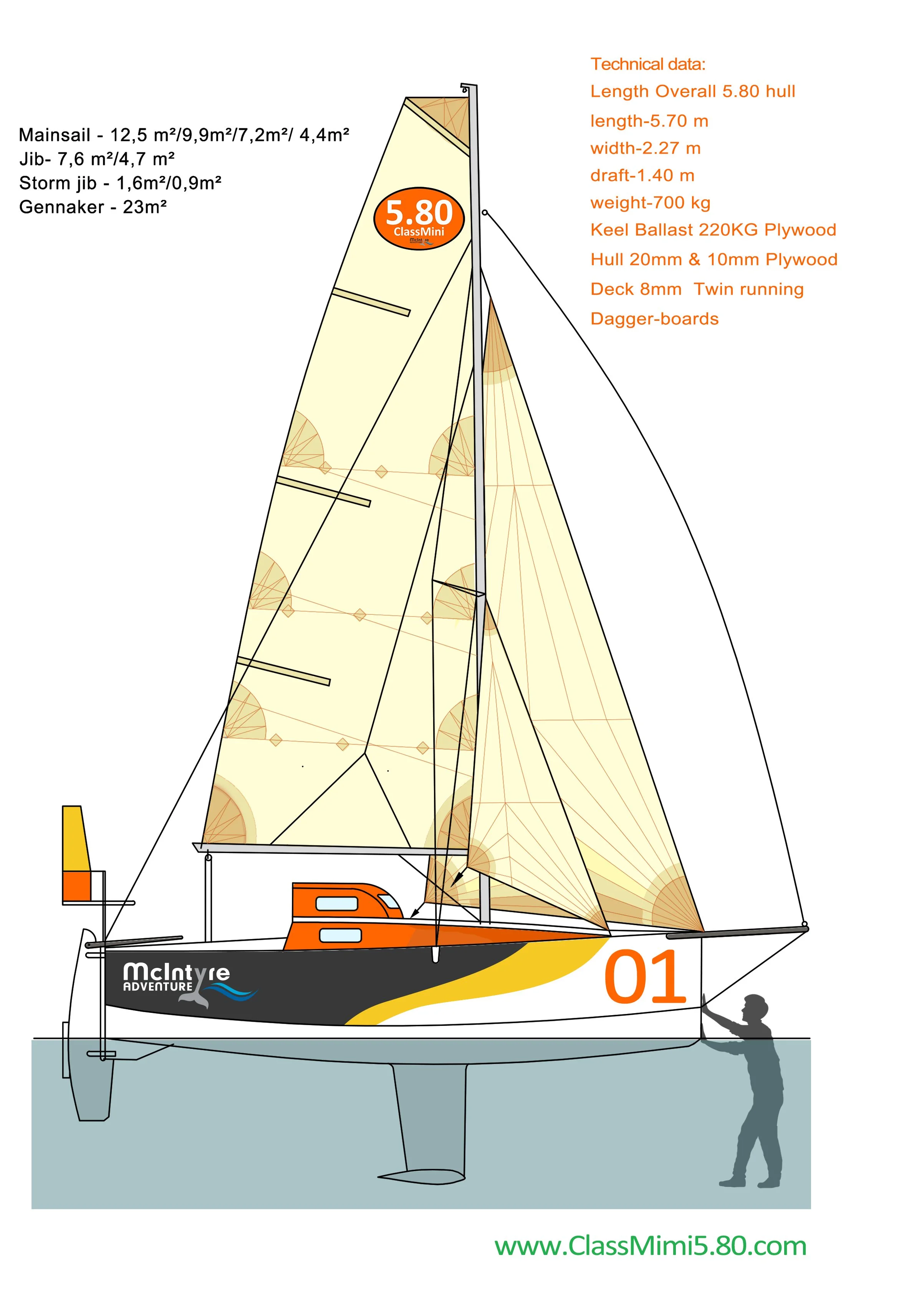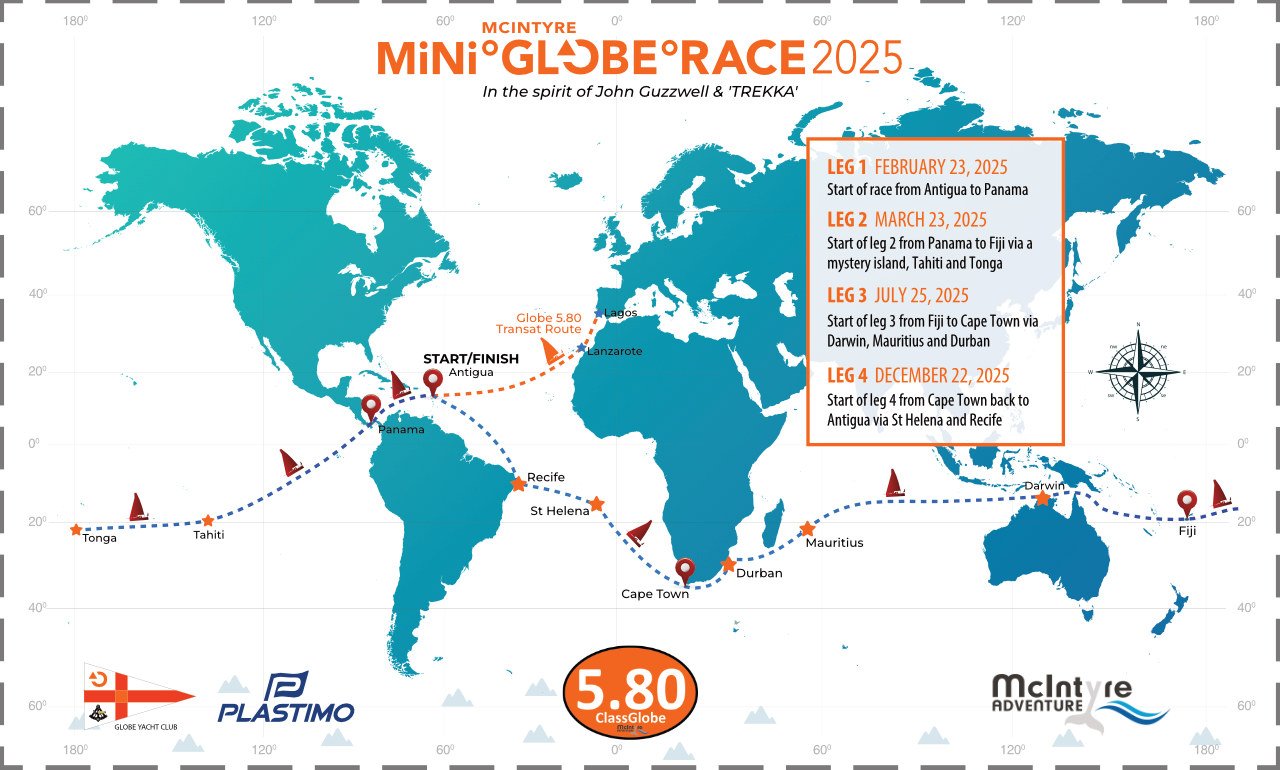Home-built from Plywood on Timber Frames
By Graham Cox author of the two-volume sailing memoir, Last Days of the Slocum Era, and correspondent for the Mini Globe Race
Almost 70 years ago, on 10 September 1955, a 25-year-old Englishman, John Guzzwell, set out from Victoria, British Columbia, on his little timber yacht, Trekka, a 20ft 6in yawl he’d built himself in a shed behind a fish and chip shop, bound for Hawaii. He did not initially intend to circumnavigate, but 33,000nm, four years and two days later, he returned home to a rapturous welcome, sailing into the history books, and writing one of the enduring classics of the sea, Trekka Round the World.
This endearing book has captured the imaginations of thousands of people, including frequent SWS contributor, Graham Cox, and veteran Australian ocean voyager and adventurer, Don McIntrye.
To mark the 70th anniversary of John Guzzwell’s achievement, Don McIntyre conceived a tribute race around the world in similar-sized boats (the Class Globe 580), to be know as the McIntyre Mini Globe Race (MGR). In this article, Graham Cox has drawn from the Mini Globe Race website (see below) to introduce this event. Graham has been appointed guest race commentator for the MGR, and will be writing weekly updates as the race progresses. These updates will be posted on the Mini Globe Race website (see below), Facebook and elsewhere. Graham will also provide SWS with regular updates of the thrills and spills from month to month.
On February 23, 2025, the McIntyre Mini Globe Race (MGR) will commence, marking the beginning of a 13-month sailing adventure that challenges both the physical and psychological endurance of its participants. In an age where technology and €20m can send a solo sailor around the world in 40 days, a fleet of courageous mini sailors is about to show it can be done for less that €50,000 over many days! Sixteen men and two women from 11 countries will navigate 28,000 miles solo around the world in identical, cramped, plywood mini yachts, pushing the limits of what many believe to be possible.
Before the main event, participants must complete a solo 3,600-mile qualifying race, solo across the Atlantic. This journey begins on December 28, 2024, from Marina de Lagos in Portugal, continues to Marina Rubicon in Lanzarote, Canary Islands, and concludes at the National Sailing Academy, Antigua . This solo transatlantic voyage is a significant challenge in itself, but only upon its completion can sailors join the McIntyre Mini Globe Race.
The yachts, known as “Class Globe 580“, are home-built from plywood on timber frames and coated in glass epoxy. 580 refers to its length in metres which is compact enough to fit in a 20ft container to and from international events. Conceived by Australian adventurer Don McIntyre, the idea emerged during his 2010 adventure sailing 4000-mile across the Pacific in an open timber whale boat with very little food, water and no charts, recreating William Bligh’s Mutiny on the Bounty journey. McIntyre, in collaboration with Polish designer Janusz Maderski, launched the one-design class in 2019, offering simple construction plans for €300. Builders can also opt for a CNC pre-cut plywood kit, supported by an active online builder’s community. Currently, over 80 yachts are in various stages of completion, with about 20 in the water and another 140 builders with plans.
The race begins and ends at the Antigua Sailing Academy. The first leg takes sailors to Shelter Bay Marina, Panama, where yachts will be transported overland to the Pacific Ocean. The second leg, starting on March 23, 2025, covers 6,500 miles to VUDA Marina in Fiji, with mandatory pit stops in the Marquesas, Tahiti, and Tonga. Each pit stop requires an eight-day minimum stay, allowing sailors to rest and make repairs.
The third leg spans 10,000 miles to Cape Town, South Africa, with stops in Darwin, Mauritius, and Durban. Given the challenging weather conditions and the notorious Agulhas current, an additional ten days of pit stops are allowed. The fourth and final leg of 7000 miles begins on December 22, 2025, with stops in St. Helena and Recife, Brazil, before the final sprint back to Antigua, expected by late March 2026.
Event organiser, Don McIntyre, veteran of a solo circumnavigation in the 1990 BOC challenge, is also the organiser of the solo Golden Globe Race and the recently completed McIntyre Ocean Globe celebrating the 50th Anniversary of the first ever Whitbread fully crewed race. McIntyre has great confidence in the Class Globe 580’s capabilities. He built and raced a Class Globe 580, named “TREKKA”, solo across the Atlantic in 2021, proving the yacht’s endurance and suitability for such a demanding race.
Sailors must undergo survival and medical training, comprehensive medical checks, and stress tests. Safety equipment adheres to world-class standards, detailed in the official Notice of Race. Restrictions include the prohibition of electronic wind instruments and logs, limited 200-amp battery and 200-watt solar panel capacity, and only electric outboard motors. Hydro generators and desalinators are not allowed. Sailors can make unpenalized stops, but the race clock continues to run, and YB3 satellite trackers provide 24-hour monitoring for everyone on the MGR website.
Unlike other solo races, MGR entrants sail as independent voyagers, with each sailor responsible for their voyage plan, logistics and safety management, overseen by individually appointed safety managers. These managers’ report to MGR event management but maintain primary responsibility for their sailors around the clock.
Don McIntyre emphasised the unique nature of the MGR, stating
The MGR, like the Golden Globe Race, will be a voyage of attrition. I have great faith in the sailors, the boats, and the meticulous planning that has gone into this event over the past five years. The Globe 580 yachts are robust, safe and fun to sail, offering an affordable challenge. The McIntyre MGR is an exciting companion to our two other unique around the world races, closing the loop and now offering true adventures to all sections of sailing. 10 years ago, I set out to bring back affordable, human around the world racing that was truly sustainable for all sailors, where money and speed at all costs is not the driving force. All three events GGR, OGR and now MGR are epic human stories.
The McIntyre Mini Globe Race promises to be an extraordinary test of endurance, skill, and courage, showcasing the human spirit’s resilience in the face of adversity.
For potential sponsors, this world-first event offers unparalleled opportunities to showcase your brand on a global stage, align with values of courage, resilience, and adventure, and engage with a passionate and diverse audience. Contact don@minigloberace.com for further discussion.
More information at globe580transat.com, classglobe580.com and minigloberace.com.
Be sure to check out our YouTube Channel: Class Globe 580. You’ll also find more content by searching ‘Class Globe 580’, including a couple of excellent documentaries about participants who built their own 580s and raced them in the Class Globe 580 Transatlantic Race.
To add to local interest, there will be up to five Australian entries in this event, including father and son duo, Mike and John Blenkinsop, sailing Delja 99 and Delja 100, which they built side by side in a shed in Mooloolaba, Queensland. Both boats are currently in Kawana Waters Marina in Mooloolaba, undergoing trials, and will be shipped to Portugal in early September. Other Australian entrants include Dan Turner, Eric Marsh, and Gary Swindail,
Keep your eye out for Graham’s in-depth review of John Guzzwell’s voyage around the world on Trekka, which will appear in SWS soon.
Graham Cox is the author of the two-volume sailing memoir, Last Days of the Slocum Era.







